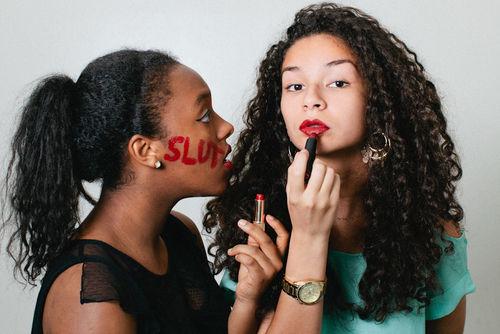I was first called a slut in 8th grade.
I was waiting for the bus when a group of girls I didn’t recognize walked past me. One of them whispered something while staring at me, and the group began laughing.
As they passed me, one girl stopped, looked directly in my eyes and delivered the insult. They continued walking, laughing to themselves over some joke I wasn’t in on.
It’s a strange feeling, being called a slut for the first time. It felt even stranger to me because, at that point, I hadn’t had any male contact at all.
I was chubby, awkward, nerdy to a fault and kept to myself. I didn’t even have friends that were guys. I didn’t know what I did to earn the hateful label.
But among the hurt and confusion, I also felt another emotion — pride. At a time when Paris Hilton and Nicole Richie were championing the “slut” moniker for preteen girls everywhere, something about the label felt validating.
Even though it was meant as an insult, it made me feel like I must be doing something right. These girls had noticed me, and maybe even envied me, because I apparently had sexual power I hadn’t yet realized.
The dance women do between feeling shamed by sexual insults and feeling empowered by them is the focus of “SLUT: The Play,” an indie show developed for middle schools, high schools and colleges that will be released later this month.
“Across the country, in middle schools, high schools and on college campuses, ‘slut’ is a word to live or die by,” says the show’s website, sluttheplay.com. “It’s simultaneously a badge of honor and the scarlet letter — and young women everywhere struggle to walk the line.”
Developed by The Arts Effect All-Girl Theater Company, “SLUT: The Play” takes the true stories of young women across the country and combines them into a single narrative, telling the story of a high school girl who, after a drunken night out with friends, has to contend with the phrase and all it means.
The show, touted as “The Vagina Monologues for Millennials,” is gaining national attention for its message.
Accompanying the play itself is the “StopSlut” movement, a roundtable discussion created by the women who wrote the play. The discussion normally takes place after students have viewed the show, and gives them an opportunity to examine the way the word has affected their own lives.
LSU has a slut-shaming problem. The volatile mixture of Southern respectability politics and the “party hard” culture the University is known for has created an environment in which no woman is safe from the label.
The term is used both viciously and teasingly, comes from both men and women, and goes so far as to label entire groups of people.
“Slut” is one of the most harmful words used to insult women. All at once, it reduces women to purely sexual creatures, shames them for having sexual desires, paints them as outcasts and forces them into the mold of a “loose woman.”
It doesn’t matter what the person the insult is hurled at has done. The term can be deployed by anyone at any time to make someone else feel like lesser than a person.
Students know that slut-shaming is wrong. Progressive organizations such as Planned Parenthood, Feminist Campus and URGE: Unite for Reproductive and Gender Equity have done everything in their power over the last few years to make sure that society understands the issue that accompany demonizing a woman for her sexual behavior.
But just because students know something is wrong doesn’t mean they’ll stop doing it.
Instead of just telling people that slut shaming is wrong, “SLUT” picks through the every iteration of the phrase — from shameful label to empowering symbol of female sexuality — and explains why people should think twice before tossing around the insult.
LSU could benefit from having “slut” broken down in real terms. “SLUT: The Play” may be able to help the campus stop using the term so nonchalantly, ultimately benefitting not just the women on campus, but the community as a whole.
I know that a play like this would have helped me immeasurably in 8th grade, and I know it could help women here at LSU, too.
Logan Anderson is a 21-year-old mass communication major from Houston, Texas. You can reach her on Twitter @LoganD_Anderson.
Opinion: New play examines the complexities of the word “slut”
February 3, 2015
More to Discover










